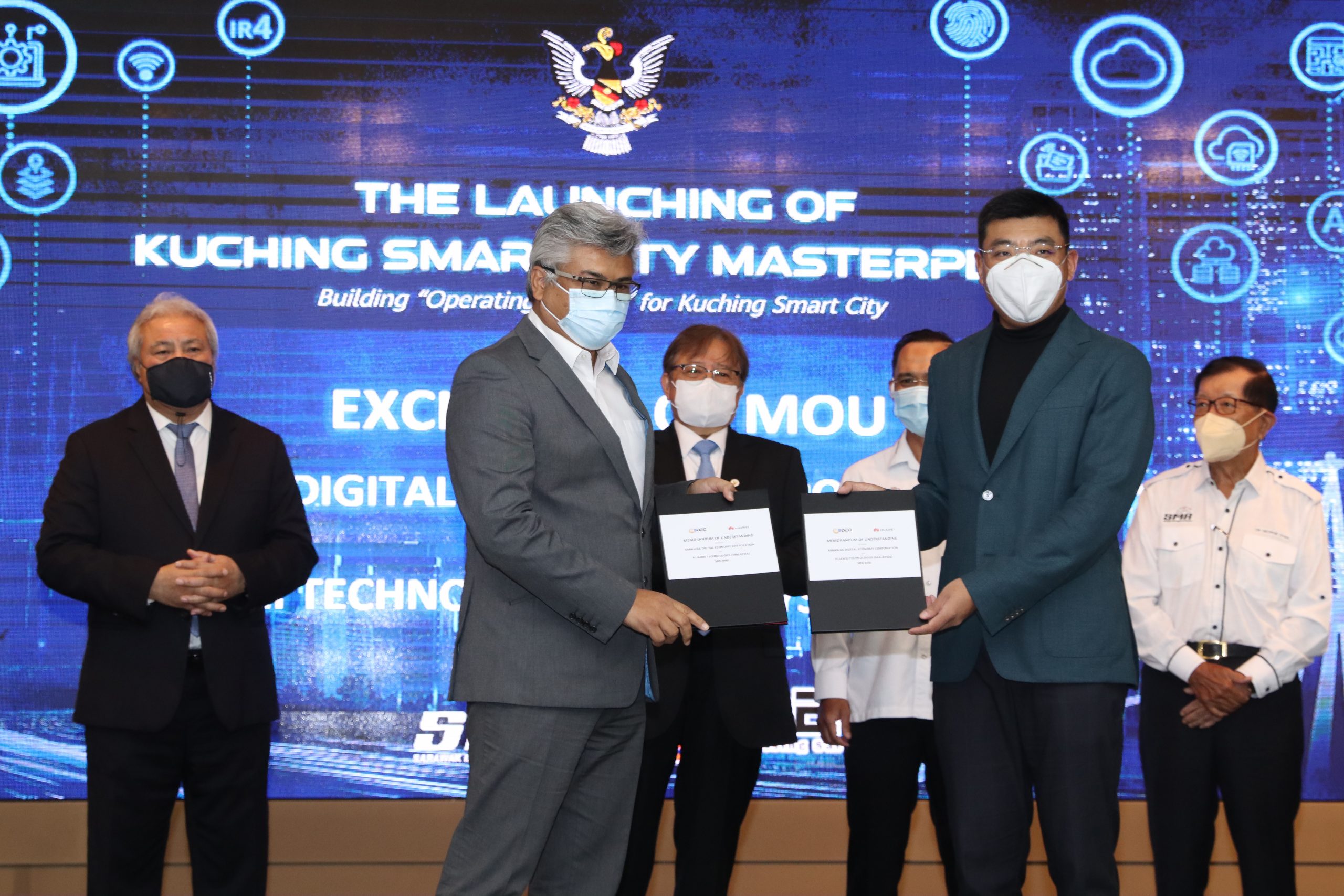KUCHING, 5 OCTOBER 2021 – The first Smart City Operating System in Malaysia will be developed in Kuching under the Kuching Smart City Masterplan (KSCMP) which was launched by Chief Minister Datuk Patinggi Abang Johari Tun Openg today.
In his speech, Abang Johari said the state government is planning to start off with Darul Hana in Petra Jaya to be connected to this smart platform before expanding to other areas including those under Padawan and Samarahan.
“Once our ART (Autonomous Rapid Transit) start, it will be connected again with our smart platform and then in other words, all the areas (in Kuching) will be integrated (to the system).
“Once it (the system) is there, people will come here and investments will come,” he said at the launching ceremony held at Wisma Bapa Malaysia.
Abang Johari also said the KSCMP is one of the government’s efforts to transform the principal cities in Sarawak to be smart cities.
He revealed there are plans to expand the concept to Bintulu, including building an ART there
“The next one will be in Bintulu because Samalaju is going to expand, and Kidurong is also going to expand. So, we need ART also between Bintulu and Samalaju for the convenience of our people in terms of mobility and also we have to connect them with this smart networking among them,” he said.
He added the future is bright for Sarawak by the year 2030 with the development of smart cities which are clean and environmentally friendly.
He also spoke about convergence of data and how this masterplan will connect people to the government in order for better services to be provided.
Meanwhile, Sarawak Multimedia Authority (SMA) general manager Dr Zaidi Razak, who spoke earlier, said the KSCMP details out how to make cities in Sarawak more liveable and prosperous for the people and businesses, by using Kuching as a model.
He pointed out a key concept in the masterplan is the Smart City Operating System, which is the first in Malaysia where it aims to deliver various system services to enable the service providers within Smart City ecosystem to participate together in innovating the city services.
He said SMA had carried out a comprehensive study last year in order to develop the KSCMP, and the objectives of the study included to identify the issues which affects the livelihood of citizens, to identify the areas of emphasis to address the issues and to recommend strategies and prioritise smart city initiatives.
“The study gathered responses of 632 citizens, 604 business entities, captains of industry, government and non-government organisations representing various interest groups on issues facing Kuching and suggestions to transform Kuching into a smart city,” he said.
Resulting from the study, he said five focus areas for Smart City namely economic growth, smart living, clean environment, digital government and digital infrastructure were identified.
From there, he said a total of 38 actionable smart city initiatives within the five focus areas were identified and strategised for implementation from 2021 until 2025.
“The initiatives are aligned with the Post Covid Development Strategy (PCDS) initiatives and the State’s 12th Malaysia Plan objectives. We had earlier initiated the Miri SMART City pilot project and together with the eventual implementation of the more comprehensive Kuching SMART City Masterplan, we intend to create a stable, resilient and sustainable operating platform for replication in other towns of Sarawak,” he said.
He also said KSCMP maps out the development of core smart city digital infrastructure platform and essential shared smart city applications where the government agencies, private sector and community could then package and deliver their services and products.
“With in-built application and data interfaces on the essential smart city apps, the government agencies, private sector and community could even extend and expand the capabilities of the as-is shared smart city apps functions. They can package the new functions into their own end user applications, such as digital health, smart transportation and smart tourism applications.
“For example, citizens will be able to connect their cameras to security solutions built on the Smart City Operation System. Hence, they do not need to allocate high investment to set up personal or community CCTV surveillance system.
“For private security service providers, they could leverage on the Operating System’s capabilities such as intrusion detection, face recognition and geo-fencing to provide innovative user centric services and create limitless business opportunities.,” he said.
He said that essentially with the Kuching Smart City as an Operating System Concept, innovation and development will not only depend on the government investment but also from the involvement of private, start-ups and individuals.
“The Kuching Smart City ecosystem also results in better optimisation of resources and enable trusted collaboration, resulting in sustainable accelerated growth of the Sarawak Digital Economy,” he added.
Among those present at the ceremony were Deputy Chief Minister Datuk Amar Awang Tengah Ali Hasan, state cabinet ministers, Sarawak Information System (Sains) chairman Datuk Patinggi Tan Sri Dr George Chan and Sarawak Digital Economy Corporation (SDEC) chairman Tan Sri Datuk Amar Mohamad Morshidi Abdul Ghani.
Also held concurrently at the event was an exchange of Memorandum of Understanding between Huawei Technologies (Malaysia) Sdn Bhd with SMA, Sains, SDEC and Centre of Technical Excellence Sarawak (Centexs).
Huawei Malaysia chief executive officer Michael Yuan, who was present, also symbolically handed over handed over tablets for underprivileged students in the state which was received by State Education director Dr Norisah Suhaili.

